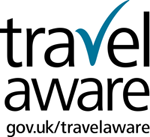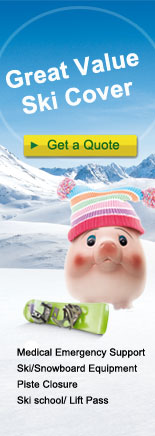Ski and Snowboard Checklist

The first thing you should do once you have booked your ski or snowboarding holiday is to buy appropriate ski insurance for your trip. A report by the Foreign, Commonwealth the-importance-of-travel-insurance Office (FCDO) highlighted that as many as 1 in 5 skiers are hitting the slopes without ski insurance.
The most important reason for buying ski insurance is to provide cover for emergency medical expenses if you have an accident on the slopes, which could easily add up to thousands of pounds.
Once you have bought ski insurance you can start thinking about the other things you need to do to prepare for your ski holiday. The FCDO has produced a ski checklist to help you prepare for the slopes.
Before you go:
- Be physically prepared and get fit for skiing. This will help you get the most out of your ski trip and reduce your risk of injury on the ski slopes. Good to practice sports include cycling and running. Also "don't push yourself too far" there's no shame in calling it a day early if you're tired and enjoying the rest of the afternoon in the spa. Most ski injuries occur on the last run of the day when you're tired.
Be aware that when you ski and snowboard you are exerting energy at high altitudes which means that your body may tire faster than usual because you are not getting enough oxygen. - Get the right ski insurance. When buying ski insurance make sure it covers all activities you might participate in e.g. sleigh rides, bob sleigh, Heli Skiing, snowboarding etc and check the small print for any hidden clauses e.g. "only covered off piste with a guide"
- Get an Global Health Insurance Card/European health insurance card (EHIC)" an EHIC proves your right to state provided health care in the EEA and Switzerland. It doesn't replace ski travel insurance because it doesn't cover the cost of all state provided health care, private medical treatment, recovery from the piste or repatriation back to the UK. However having an EHIC can save you money "if using an EHIC when you receive medical treatment reduces the costs payable by the insurer we will waive the excess on your claim.
- Stay sun safe. Perhaps not the obvious things to pack for a ski or snowboard holiday but the sun is much stronger at altitude, and you get a double hit when it reflects off the snow so sunglasses and high factor sun cream are essential items to avoid risk of burn and protect your eyes.
When you're there:
- Know your limits. A night of après ski or a boozy lunch can affect you more quickly at high altitudes. Be aware of your limits to stay safe on and off the slopes. If walking home at night make sure you keep to the designated resort paths and wrap up warm.
- Keep hydrated. Exercise in high altitude can lead your body to tire and dehydrate faster than usual so you'll need to drink between four to six litres of water a day.
- Wear a ski helmet. More and more people are choosing to wear ski helmets on the slopes, in fact, these days you are more likely to look out of place without one. A ski helmet provides protection from head injuries if you fall over, remember you don't need to be travelling at high speed or doing tricks for a ski helmet to make a difference - why take the risk of skiing without one. In some resorts it is a legal requirement for children to wear ski helmets.
- Stretch and warm up. Cold weather can cause tension in your muscles making them more prone to injury. Make sure you stretch well by doing a few warm up exercises before you hit the ski slopes.
- Choose the right piste for your level of skiing. It might be tempting to impress your friends with that black run but overstretching yourself may lead you down a slippery slope. Also be aware that grading levels can be different; what may be a blue run in France may be a red run in Austria.
- Be sensible off piste. If you're seeking fresh powder and unless you are trained, it is sensible to go with a group led by a professional ski guide. Pack the right equipment such as a probe pole and shovel.
- Be avalanche aware. Make sure you read or listen to the daily avalanche forecast to minimise your risk of being caught in one. The steeper the slope you ski on, the greater the avalanche risk.
More ski safety information
The International Ski Federation publishes 10 rules to which all skiers and snowboarders should abide by to help keep all mountain users safe.
 Digg
Digg
 Reddit
Reddit
 Facebook
Facebook
 Tweet This
Tweet This




